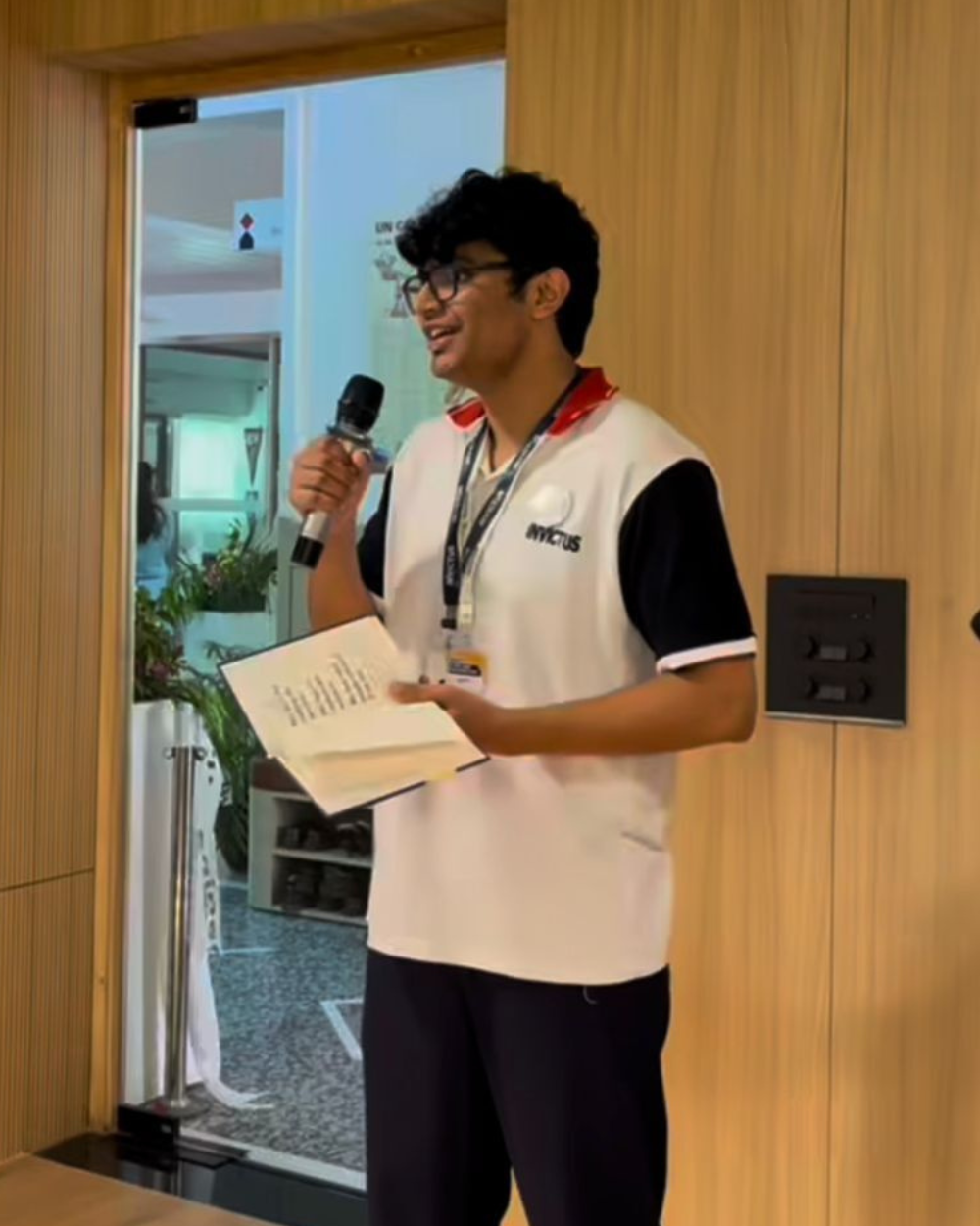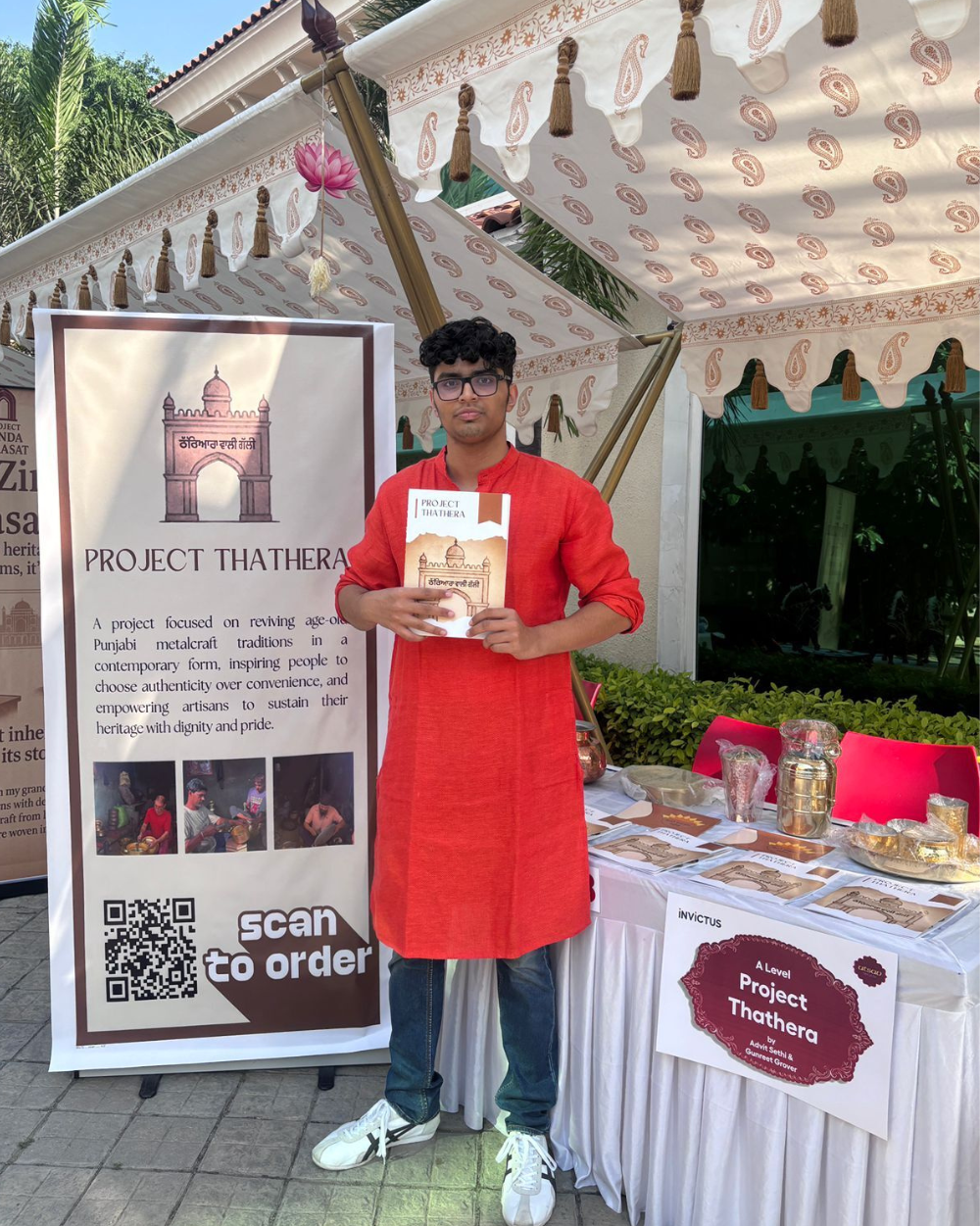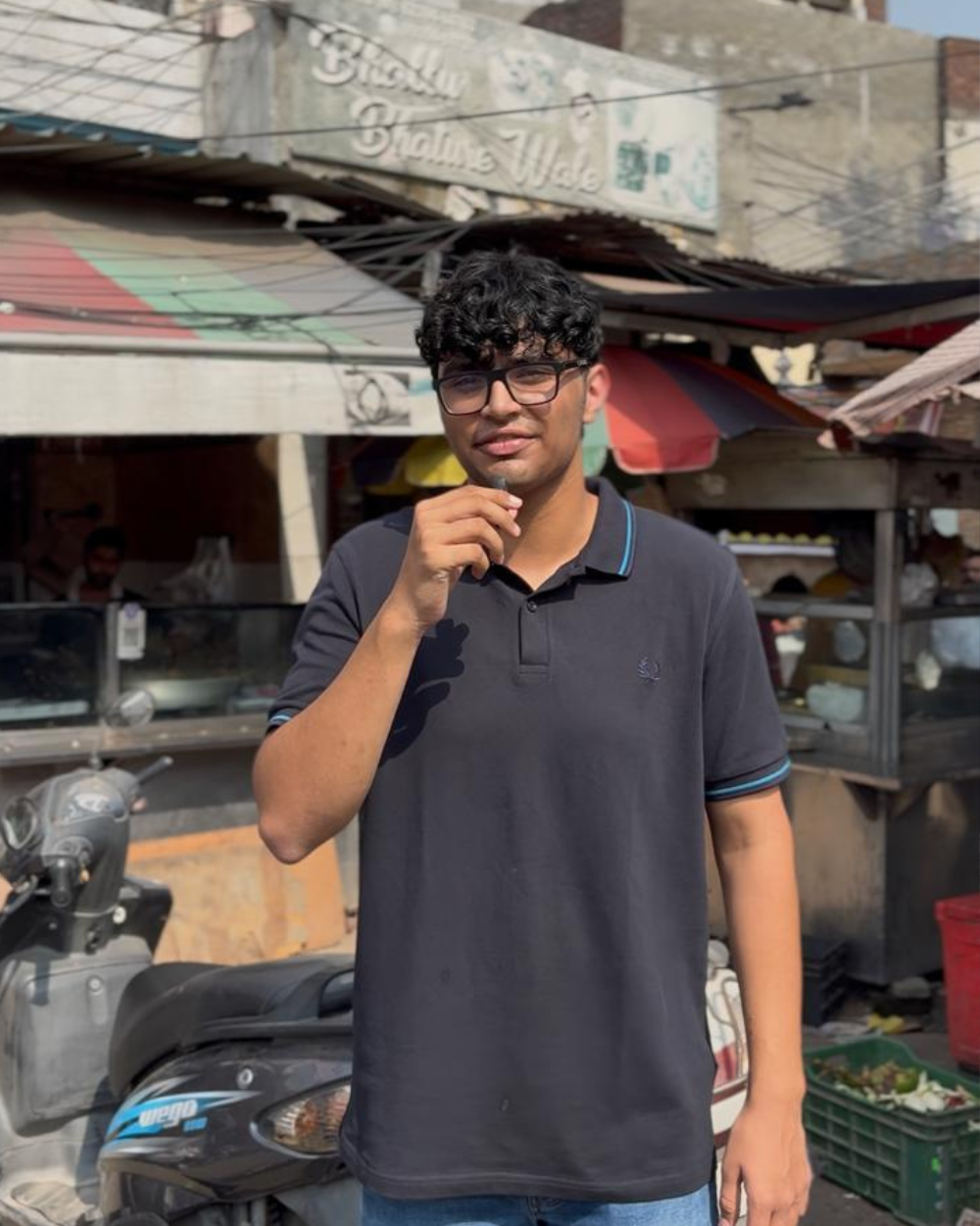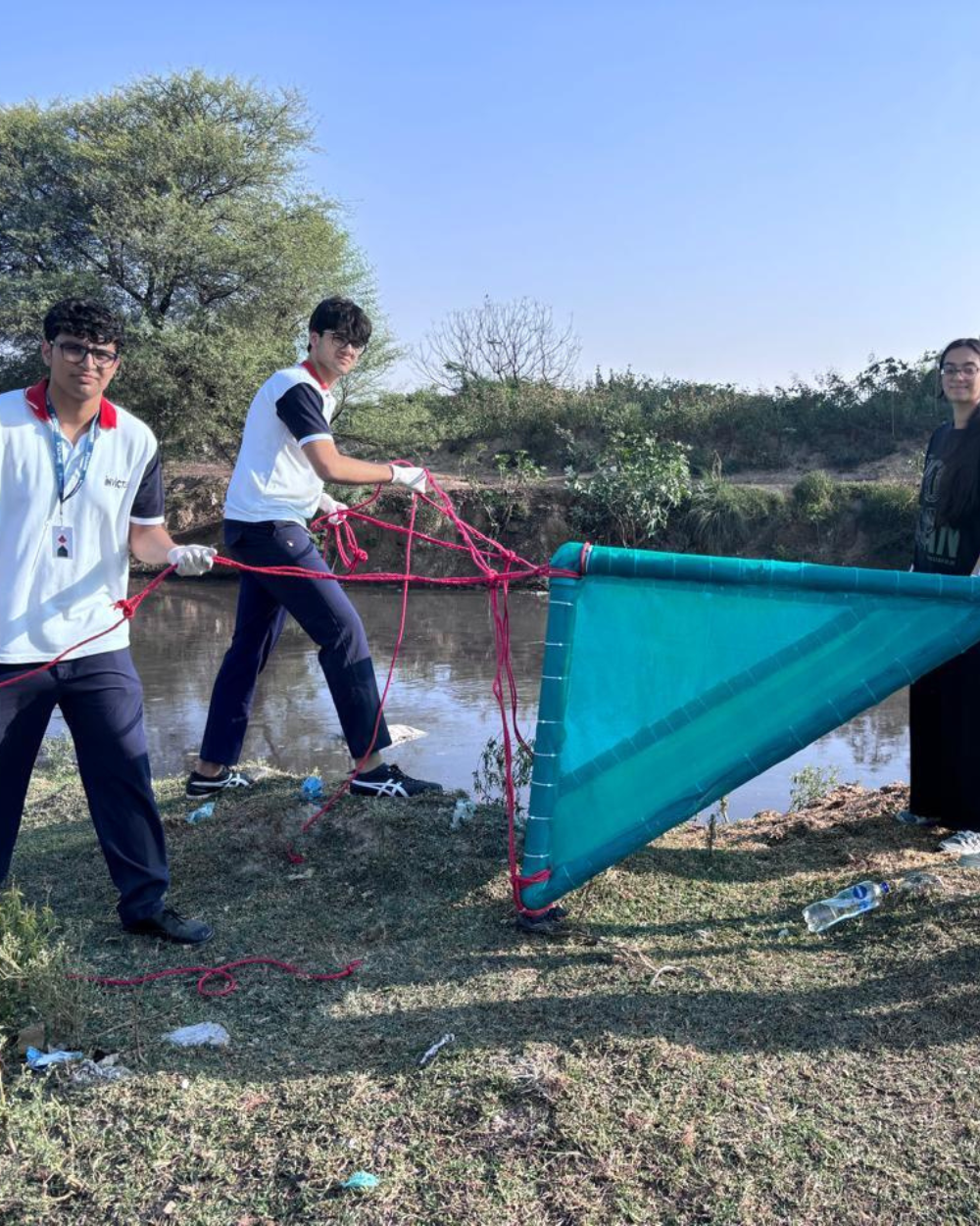
Advit Sethi
Innovator, Student Economist, Agripreneur, Researcher, Food Blogger


Innovator, Student Economist, Agripreneur, Researcher, Food Blogger

I hope to keep building ideas that start small but create ripples - solutions that
empower people, strengthen communities, and turn challenges into opportunities.
Hello! I’m Advit Sethi - an innovator, student economist, agripreneur, researcher, food blogger, and Student Body President at Invictus International School. My work is driven by a deep curiosity about how economics, sustainability, and innovation intersect - especially within food systems and the lives of the farmers behind them.
I love building practical solutions to real-world challenges - from designing a hexagonal contraption that eliminates the need for Thathera artisans to balance heavy bartans between their feet, to creating the Aqualith Rover, a semi-automatic device focused on de-pumping and desilting to improve flood relief and water access on farms. I also designed a separate contraption to clean the Tung Dhab Canal, addressing local waterway pollution head-on.
My entrepreneurial spirit extends to the culinary world too - building on my family’s export business, I built a domestic celery spice line, transforming a traditional crop into an innovative product and exploring how value addition can empower farmers and reshape consumer habits.

Commended by the DC, Government of Punjab & All India Human Rights CouncilI founded Project Thathera to support the UNESCO-recognized Thathera metalcraft community and preserve Punjab’s intangible cultural heritage. Working with over 15 artisans, I curated brand identities, developed sustainable business models, and designed new product lines blending traditional craftsmanship with modern aesthetics. I built and upgraded artisan workstations, improving safety and productivity, and organized Diwali exhibitions that generated ₹25 lakh+ in collective artisan income. I also compiled and translated a compendium of government schemes for artisans into Punjabi and Hindi, ensuring accessibility across rural communities. Additionally, I lobbied for policy reform by writing to state and national authorities and collaborated with Mr. Ankur Warikoo to create long-term digital and entrepreneurial strategies, empowering artisans to sustain their craft both culturally and economically.


Commended by the Local Member of Parliament (MP)I founded Project Navbhoomi to address Punjab’s growing flood crisis and protect farmers’ livelihoods. Through the project, I developed Aqualith, a semi-automatic rover equipped with a high-suction pump designed to remove stagnant water and desilt flood-hit farmlands. Built using affordable, locally serviceable components such as an ESP32 controller, BTN7960 motor driver, and LiPo battery, Aqualith offers a scalable, sustainable solution to post-flood soil restoration. The rover’s efficiency and accessibility make it particularly suited for smallholder farmers. To date, Project Navbhoomi has successfully restored over 20 acres of farmland, helping communities reclaim cultivable land, prevent crop loss, and rebuild economic stability. The initiative demonstrates how low-cost engineering and innovation can translate into meaningful environmental and social impact.

Project Thela is an initiative I founded to support street food vendors and promote their culinary businesses. I created a catalogue for 20+ thelas, launched a food blog to share their stories, and promoted hygiene and safety practices. Through collaborations with schools and events like Diwali exhibitions, vendors gained catering opportunities, higher income, and sustainable customer bases, blending entrepreneurship with real community impact.

As a core team member of Project Bayou, I helped design low-cost, scalable solutions to clean Amritsar’s polluted Tung Dhab Drain, which discharges untreated sewage into local water systems. Using repurposed materials and locally available components, our team developed a functional prototype capable of collecting floating waste and assisting in water restoration. The model was approved by Guru Nanak Dev University’s Innovation Cell and commended by a government-funded ITI for its innovation, affordability, and potential for large-scale replication. Through the project, I gained firsthand experience in combining environmental engineering, social responsibility, and practical problem-solving to create sustainable, community-oriented impact.

Commended by the DC, Government of Punjab & All India Human Rights CouncilI founded Project Thathera to support the UNESCO-recognized Thathera metalcraft community and preserve Punjab’s intangible cultural heritage. Working with over 15 artisans, I curated brand identities, developed sustainable business models, and designed new product lines blending traditional craftsmanship with modern aesthetics. I built and upgraded artisan workstations, improving safety and productivity, and organized Diwali exhibitions that generated ₹25 lakh+ in collective artisan income. I also compiled and translated a compendium of government schemes for artisans into Punjabi and Hindi, ensuring accessibility across rural communities. Additionally, I lobbied for policy reform by writing to state and national authorities and collaborated with Mr. Ankur Warikoo to create long-term digital and entrepreneurial strategies, empowering artisans to sustain their craft both culturally and economically.

Commended by the Local Member of Parliament (MP)I founded Project Navbhoomi to address Punjab’s growing flood crisis and protect farmers’ livelihoods. Through the project, I developed Aqualith, a semi-automatic rover equipped with a high-suction pump designed to remove stagnant water and desilt flood-hit farmlands. Built using affordable, locally serviceable components such as an ESP32 controller, BTN7960 motor driver, and LiPo battery, Aqualith offers a scalable, sustainable solution to post-flood soil restoration. The rover’s efficiency and accessibility make it particularly suited for smallholder farmers. To date, Project Navbhoomi has successfully restored over 20 acres of farmland, helping communities reclaim cultivable land, prevent crop loss, and rebuild economic stability. The initiative demonstrates how low-cost engineering and innovation can translate into meaningful environmental and social impact.

Project Thathera is an initiative I founded to support Thathera artisans and preserve traditional brass and copper crafts. I curated brand identities for 10+ artisans, designed new product lines, and built workstations to improve safety and efficiency. I also created a professional catalogue, launched an online marketplace and Instagram page, and organized Diwali exhibitions to expand their reach. Additionally, I helped artisans access government schemes and collaborated with Mr. Ankur Warikoo on long-term growth strategies, empowering them both culturally and economically.

As a core team member of Project Bayou, I helped design low-cost, scalable solutions to clean Amritsar’s polluted Tung Dhab Drain, which discharges untreated sewage into local water systems. Using repurposed materials and locally available components, our team developed a functional prototype capable of collecting floating waste and assisting in water restoration. The model was approved by Guru Nanak Dev University’s Innovation Cell and commended by a government-funded ITI for its innovation, affordability, and potential for large-scale replication. Through the project, I gained firsthand experience in combining environmental engineering, social responsibility, and practical problem-solving to create sustainable, community-oriented impact.
At TEDxBasant Nagar, I redefined the Punjabi spirit of Chard Kala-not merely as optimism, but as a story of resilience and perseverance. Drawing from the experiences of Punjab’s farmers, I explored how communities rebuild with courage amid adversity. My talk, later uploaded to the official TEDx YouTube channel, celebrated this resilience while envisioning an Amritsar rooted in dignity and progress.

Sanjeevini is a farm-to-table celery spice brand I founded to reimagine my family’s export-based agricultural business for the domestic market. For decades, our enterprise exported raw celery products abroad, but within India, the spice had no identity or market presence. I developed Sanjeevini to bridge that gap—creating a brand that sources, processes, and packages celery spice entirely within Punjab. From designing sachets and branding to building local distribution and farmer partnerships, I positioned celery as a versatile, sustainable Indian spice rather than a foreign commodity. Sanjeevini embodies both innovation and revival—bringing an export crop back home, from Punjab’s farms to Indian tables.
I delivered a TEDx talk titled “The Spirit of Chardi Kala”, featured on the official TEDx YouTube channel. In this talk, I reflected on Punjab’s history of floods, wars, and challenges, highlighting how the concept of Chardi Kala—relentless optimism and unwavering spirit—guides its people to overcome adversity, protect their communities, and sustain their livelihoods. The talk emphasizes the power of perseverance, cultural pride, and collective resilience.
As Student Body President, I promoted financial literacy, organized the National Entrepreneurship Challenge with 900+ teams, and led a $3,000 fundraiser for farmers. I developed a Financial Empowerment Manual for Women, conducted insurance awareness workshops, and facilitated micro-loans to enhance financial independence. As House Vice Captain, I coordinated inter-house events, built team spirit, and encouraged inclusive participation. As School Cricket Team Captain, I led the team to multiple inter-zonal victories and organized the Founders Cup tournament. As Entrepreneurship Captain, I mentored student innovators, guided business projects, and led my team to 2nd place in the Young Entrepreneur of the Year Challenge. Additionally, as an AP Ambassador, I promoted Advanced Placement participation and academic rigor across the student body.
Through internships at SuppleTek, Kwality Pharma, Raymond Ltd., CA Nimish Nagpal & Co., and DRRK Foods, I gained practical exposure to finance, business strategy, and operations. I developed financial models for forecasting and investment analysis, advised on risk management, and contributed to strategic decision-making. These experiences strengthened my analytical and problem-solving abilities while deepening my understanding of how economic principles drive real-world business outcomes.
I have authored seven research papers under mentors including Prof. K.S. Randhawa, Dr. Ritu Dhawan, and Dr. H.B. Gupta, exploring the intersections of economics, sustainability, and institutional behavior. My work spans behavioral finance, agricultural economics, and public policy, with several papers currently under review. I was published in the Sagacity Journal for my paper on heuristic-driven market anomalies, and co-authored a published economics textbook with over 1,000 readers. Notable studies include “Incentive Structures: How Differing Institutional Incentives Influence Productivity and Innovation in Public vs. Private Enterprises,” which analyzes how incentive design drives innovation, and “Flood Vulnerability: Economic and Policy Strategies to Reduce Flood-Related Risks Among Punjab’s Farmers,” which proposes adaptive irrigation and insurance frameworks to strengthen rural resilience. Collectively, these experiences refined my ability to apply quantitative reasoning and policy evaluation to complex, real-world problems.
This award recognizes outstanding dedication and achievement in academics. It honors consistent high performance across all subjects, reflecting a strong commitment to learning and personal growth. Receiving this award is a testament to perseverance, discipline, and the pursuit of scholastic excellence.